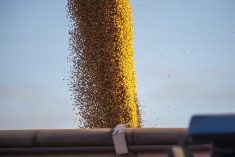Sao Paulo | Reuters — Brazilian wheat millers association Abitrigo opposes the approval of genetically modified wheat products for sale in Brazil, saying it will make imports of the cereal more costly and impact prices on the domestic market.
The statement comes after Argentine authorities approved a new genetically modified wheat that can resist drought and tolerates the herbicide glufosinate sodium.
Argentina is a major supplier of wheat to Brazil, accounting for about 60 per cent of Brazilian imports. Another 10 per cent comes from other destinations while Brazil’s own domestic production caters to 30 per cent of the market, according to Abitrigo.
Read Also

U.S. grains: Corn rebounds from contract lows on short covering, bargain buying
Bargain buying and short covering lifted U.S. corn futures on Monday after the market slid to contract lows on expectations for strong U.S. output, traders said.
Argentina’s genetically modified wheat seed is called HB4 and was developed by Bioceres and France’s Florimond Desprez.
A Bioceres source said it has scheduled a series of meetings with Abitrigo directors to understand their doubts and concerns, without elaborating.
The Brazilian government has not replied to emails and phone calls regarding the process of approval for GMO wheat sales and imports.
Abitrigo said that for about 30 years, GMO wheat has been analyzed by the international scientific community, as well as governments and consumer groups in Canada, the U.S., Australia and the EU, where per-capita consumption of wheat is twice as high as in Brazil.
Abitrigo contends GMO wheat lacks any obvious benefits to people, adding that the purpose of cultivating it is merely to increase yields in growing fields.
— Reporting for Reuters by Ana Mano in Sao Paulo and Maximilian Heath in Buenos Aires.















